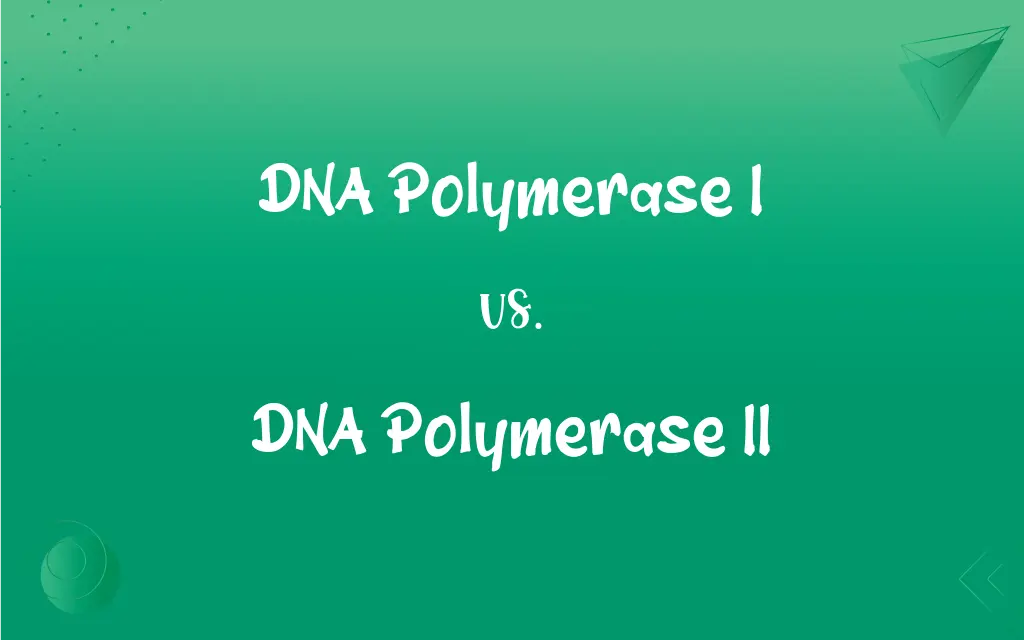DNA Polymerase I vs. DNA Polymerase II: What's the Difference?
Edited by Aimie Carlson || By Janet White || Published on March 3, 2024
DNA Polymerase I is involved in DNA repair and primer removal, whereas DNA Polymerase II participates in DNA repair and replication error checking.

Key Differences
DNA Polymerase I, discovered first, plays a crucial role in DNA replication and repair, particularly in removing RNA primers and replacing them with DNA. DNA Polymerase II, identified later, is primarily involved in DNA repair processes, particularly in dealing with DNA damage during replication.
DNA Polymerase I is characterized by its 5’ to 3’ exonuclease activity, which is essential for primer removal and gap-filling. On the other hand, DNA Polymerase II, lacking this exonuclease activity, is more specialized in the proofreading and editing functions during DNA repair.
In terms of structure, DNA Polymerase I is larger and more complex, with multiple functional domains. DNA Polymerase II, while also complex, has a different structural composition that suits its specialized role in DNA repair.
DNA Polymerase I is essential for the final stages of DNA replication, ensuring accuracy and completeness. In contrast, DNA Polymerase II is more of a backup enzyme, playing a role when the primary DNA polymerase encounters damage.
The discovery and study of DNA Polymerase I and DNA Polymerase II have significantly enhanced our understanding of cellular processes, showcasing how different enzymes have evolved for specific roles in DNA metabolism.
ADVERTISEMENT
Comparison Chart
Primary Function
Removes RNA primers, fills gaps during DNA replication.
Involved in DNA repair, error checking during replication.
Enzymatic Activity
Has 5’ to 3’ exonuclease activity.
Lacks 5’ to 3’ exonuclease activity.
Structural Complexity
Larger and more complex enzyme.
Structurally distinct, suited for repair functions.
Role in Replication
Essential for finishing DNA replication.
Acts as a backup during replication stress.
Research Significance
First discovered, critical in understanding DNA replication.
Important for insights into DNA repair mechanisms.
ADVERTISEMENT
DNA Polymerase I and DNA Polymerase II Definitions
DNA Polymerase I
DNA Polymerase I is an enzyme that replaces RNA primers with DNA segments.
During DNA replication, DNA Polymerase I replaces the RNA primer with DNA.
DNA Polymerase II
DNA Polymerase II is primarily a DNA repair enzyme.
DNA Polymerase II corrects errors encountered during DNA replication.
DNA Polymerase I
DNA Polymerase I is essential for DNA replication fidelity.
The accuracy of DNA replication is partly due to DNA Polymerase I.
DNA Polymerase II
DNA Polymerase II enhances the overall fidelity of DNA replication.
The presence of DNA Polymerase II minimizes replication errors.
DNA Polymerase I
It has a role in repairing DNA.
DNA Polymerase I repairs mismatches in the DNA strand.
DNA Polymerase II
It is a backup polymerase during DNA replication.
In case of replication stress, DNA Polymerase II assists in DNA synthesis.
DNA Polymerase I
It is involved in filling gaps left after primer removal.
DNA Polymerase I fills the gaps to complete the DNA strand.
DNA Polymerase II
It participates in the proofreading of newly synthesized DNA.
DNA Polymerase II ensures the accuracy of DNA replication.
DNA Polymerase I
DNA Polymerase I possesses 5’ to 3’ exonuclease activity.
The exonuclease activity of DNA Polymerase I is crucial for primer removal.
DNA Polymerase II
DNA Polymerase II lacks 5’ to 3’ exonuclease activity.
Unlike DNA Polymerase I, DNA Polymerase II does not remove RNA primers.
FAQs
What is the main role of DNA Polymerase II?
Its main role is in DNA repair and error checking.
What is DNA Polymerase II?
It's an enzyme primarily involved in DNA repair.
How does DNA Polymerase I function in replication?
It replaces RNA primers with DNA and fills gaps.
Does DNA Polymerase I have exonuclease activity?
Yes, it has 5’ to 3’ exonuclease activity.
Is DNA Polymerase II involved in replication?
It assists in replication under stress conditions.
What is DNA Polymerase I?
It's an enzyme involved in DNA replication and repair.
Is DNA Polymerase I larger than DNA Polymerase II?
Yes, it is structurally larger and more complex.
What distinguishes DNA Polymerase I from II?
Their primary functions and structural features.
How was DNA Polymerase I discovered?
It was the first DNA polymerase discovered during studies on DNA replication.
Do both enzymes participate in primer removal?
Only DNA Polymerase I is involved in primer removal.
Does DNA Polymerase II remove RNA primers?
No, it lacks 5’ to 3’ exonuclease activity.
Are both enzymes essential for DNA fidelity?
Yes, both play roles in ensuring DNA accuracy.
What happens if DNA Polymerase II is nonfunctional?
DNA repair processes may be compromised.
Can DNA Polymerase II function in replication?
Yes, as a backup during replication stress.
Is DNA Polymerase II essential for cell survival?
It is important, but not as critical as DNA Polymerase I.
Are there conditions where both enzymes overlap in function?
Yes, in certain DNA repair and replication scenarios.
What happens if DNA Polymerase I is nonfunctional?
DNA replication might be incomplete or inaccurate.
Can DNA Polymerase I function in DNA repair?
Yes, it has a significant role in DNA repair.
What is the significance of DNA Polymerase II?
It's crucial for understanding DNA repair mechanisms.
What is the impact of mutations in these enzymes?
Mutations can lead to replication errors and DNA damage.
About Author
Written by
Janet WhiteJanet White has been an esteemed writer and blogger for Difference Wiki. Holding a Master's degree in Science and Medical Journalism from the prestigious Boston University, she has consistently demonstrated her expertise and passion for her field. When she's not immersed in her work, Janet relishes her time exercising, delving into a good book, and cherishing moments with friends and family.
Edited by
Aimie CarlsonAimie Carlson, holding a master's degree in English literature, is a fervent English language enthusiast. She lends her writing talents to Difference Wiki, a prominent website that specializes in comparisons, offering readers insightful analyses that both captivate and inform.































































